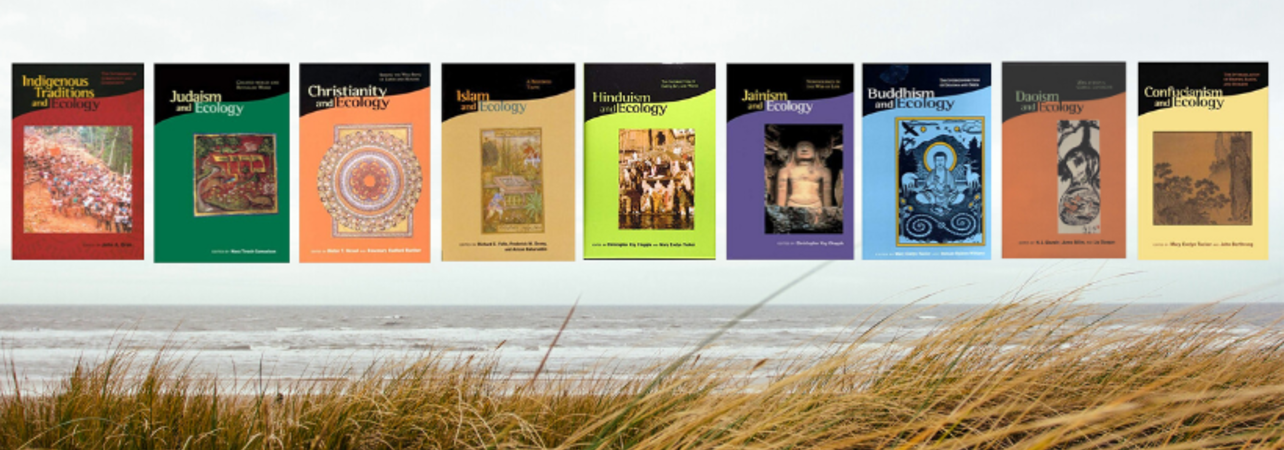Center for the Study of World Religions, Harvard Divinity School
Distributed by Harvard University Press
Mary Evelyn Tucker and John Grim, series editors
Religions of the World and Ecology Series Description:
The Religions of the World and Ecology conference series, hosted by the Center for the Study of World Religions (CSWR) at Harvard Divinity School, was the result of research conducted at the CSWR over a three-year period (1996-1998). The conferences were organized by Mary Evelyn Tucker and John Grim and involved the direct participation and collaboration of more than 800 scholars, theologians, religious leaders, and environmental specialists from around the world.
These conferences were sponsored by the Center for the Study of World Religions at Harvard Divinity School, and co-sponsored by Bucknell University and the Center for Respect of Life and Environment, which was part of the Humane Society of the United States.
In order to make the fruits of this work available to larger audiences, Tucker and Grim served as series editors for the volumes comprised of articles written for the conferences. The Religions of the World and Ecology publications series helped initiate a new field of study in religion and explored the implications for other fields, such as environmental ethics and public policy.
The conference organizers express their appreciation for the generous support of the following institutions and individuals: V. Kann Rasmussen Foundation, the Aga Khan Trust for Culture, Association of Shinto Shrines, Nathan Cummings Foundation, Dharam Hinduja Indic Research Center at Columbia University, Germeshausen Foundation, Harvard Buddhist Studies Forum, Harvard Center for Middle Eastern Studies, Harvard Divinity School Center for the Study of Values in Public Life, Jain Academic Foundation of North America, Albert and Vera List Endowment, John D. and Catherine T. MacArthur Foundation, Laurance Rockefeller, Sacharuna Foundation, Surdna Foundation, Theological Education to Meet the Environmental Challenge, and the Winslow Foundation.
The enormous challenges posed by the environmental crisis in its many complex and interlinking aspects have been much debated. Exploding population, diminishing resources, overconsumption, crippling poverty, rampant pollution, climate change, and unrestrained industrialization have created seemingly insoluble problems of global proportions. In searching for solutions to these interrelated problems, it is becoming increasingly clear that what is needed is recovery of mutually enhancing human-earth relations. One approach to reestablish a sense of balance with nature is to draw on worldviews that reflect this sense of reciprocity. This series examines the ecological implications of the beliefs, attitudes, rituals, and doctrines of various world religions in order to discover what they might offer to both the larger interdisciplinary dialogue on the environmental crisis and to the more immediate, pragmatic aspects of public policy and environmental ethics.
An introductory essay to each of the volumes written by conference organizers Mary Evelyn Tucker and John Grim entitled, “The Challenge of the Environmental Crisis,” provides an introduction to the topic of religion and ecology.
Below you will find links which provide the table of contents and introductory essay for each volume and will take you to the Harvard University Press site where they can be purchased. Please note that you may also find discounted second-hand copies on Amazon Markeptplace and at other online third-party resellers.
| Volume Titles | Volume Editors | Publication Date | |
 |
John Grim |
2001 |
|
 |
Mary Evelyn Tucker |
1998 |
|
 |
N. J. Girardot |
2001 |
|
 |
Mary Evelyn Tucker |
1997 |
|
|
Shinto (Released only in Japanese) |
Rosemarie Bernard |
2004 |
|
 |
Christopher Key Chapple |
2000 |
|
 |
Christopher Key Chapple |
2002 |
|
 |
Hava Tirosh-Samuelson |
2002 |
|
 |
Dieter Hessel |
2000 |
|
 |
Richard Foltz |
2003 |
|
Go here to see the full archive of conference materials.

